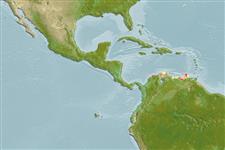Environment: milieu / climate zone / depth range / distribution range
Ecology
Marine; brackish; pelagic-neritic; depth range 1 - 2 m (Ref. 189). Tropical; 14°N - 7°N, 75°W - 59°W (Ref. 189)
Western Central Atlantic: Trinidad and westward to Margarita Island and the Gulf of Venezuela; reaches Cartagena in Colombia if the reported occurrence there (Ref. 5518) is correct.
Size / Weight / Age
Maturity: Lm ? range ? - ? cm
Max length : 14.0 cm TL male/unsexed; (Ref. 5217); common length : 12.0 cm TL male/unsexed; (Ref. 5217)
Dorsal spines (total): 0; Anal spines: 0; Anal soft rays: 23 - 27. Snout sharply pointed but short, less than eye diameter; maxilla long, tip pointed, reaching almost to gill opening; gill cover canals of panamensis-type. Anal fin moderate, its origin below or just before midpoint of dorsal fin base. A silver stripe along flank, less than eye diameter.
Occurs in shallow coastal waters, sometimes in large schools, and also in mangrove-lined lagoons in turbid water. On the southern coast of Margarita Island, they appear mainly in February to May at 5-7 cm SL, while larger individuals occur throughout the year in the interior of lagoons. More data needed on food and breeding.
Life cycle and mating behavior
Maturity | Reproduction | Spawning | Eggs | Fecundity | Larvae
Spawn in school (Ref. 205).
Whitehead, P.J.P., G.J. Nelson and T. Wongratana, 1988. FAO Species Catalogue. Vol. 7. Clupeoid fishes of the world (Suborder Clupeoidei). An annotated and illustrated catalogue of the herrings, sardines, pilchards, sprats, shads, anchovies and wolf-herrings. FAO Fish. Synop. 125(7/2):305-579. Rome: FAO. (Ref. 189)
IUCN Red List Status (Ref. 130435: Version 2024-1)
Threat to humans
Harmless
Human uses
Fisheries: minor commercial
Tools
Special reports
Download XML
Internet sources
Estimates based on models
Phylogenetic diversity index (Ref.
82804): PD
50 = 0.5000 [Uniqueness, from 0.5 = low to 2.0 = high].
Bayesian length-weight: a=0.00513 (0.00234 - 0.01125), b=3.14 (2.97 - 3.31), in cm total length, based on LWR estimates for this Genus-body shape (Ref.
93245).
Trophic level (Ref.
69278): 3.4 ±0.4 se; based on size and trophs of closest relatives
Resilience (Ref.
120179): High, minimum population doubling time less than 15 months (Preliminary K or Fecundity.).
Fishing Vulnerability (Ref.
59153): Low vulnerability (10 of 100).
